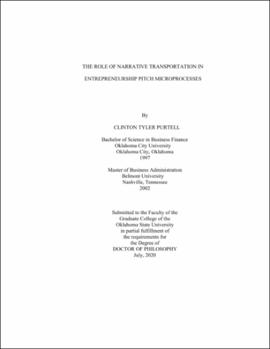| dc.contributor.advisor | Rutherford, Matthew W. | |
| dc.contributor.author | Purtell, Clinton Tyler | |
| dc.date.accessioned | 2021-02-22T22:24:12Z | |
| dc.date.available | 2021-02-22T22:24:12Z | |
| dc.date.issued | 2020-07 | |
| dc.identifier.uri | https://hdl.handle.net/11244/328622 | |
| dc.description.abstract | This research conceptualizes startup investments as a function of three interconnected factors influencing each other: entrepreneurs, the opportunity/venture, and investors Entrepreneurs must effectively communicate their ideas in a manner that investors can understand and accept in order to secure funding for start-up ventures. Entrepreneurs utilize a pitch to explain the new venture concept and motivate investors to invest. If an investor is familiar with a narrative, its characters, or plot, they will be more interested and engaged. Investors may seek to incorporate additional thoughts, make suggestions to adapt the opportunity and ultimately render a decision of whether to commit resources. | |
| dc.description.abstract | Narrative transportation theory suggests persuasive communication changes attitudes and perceptions through connections to characters or affective cognitive responses to the themes or messages contained within a narrative. When the effects of narrative transportation are experienced, individuals are transported into a story and may begin to accept a narrative world in lieu of real-world facts, knowledge or personal experiences. Narrative transportation can activate cognitive processes such as mental simulation and cognitive elaboration. If investors are narratively transported into the pitch narrative, collaboration and idea exchange may increase as investors generate new ideas, improvements or adaptations that may be perceivably incorporated into a proposed opportunity. | |
| dc.description.abstract | Path analysis was used to analyze two studies conducted to understand how familiar pitch narratives can transport investors, stimulate certain cognitive processes (perceived realism, cognitive elaboration, and thought confidence), and lead to mentally simulated adaptations so that resource commitment decisions can determined. Results from the studies confirmed that cognitive processes induced by narrative transportation fully mediate the relationship between familiarity and entrepreneurial opportunity adaptation, and that entrepreneurial adaptation has a positive significant relationship with resource decision making, such that at high levels of entrepreneurial opportunity adaptation there is an increase likelihood of resource commitments. | |
| dc.format | application/pdf | |
| dc.language | en_US | |
| dc.rights | Copyright is held by the author who has granted the Oklahoma State University Library the non-exclusive right to share this material in its institutional repository. Contact Digital Library Services at lib-dls@okstate.edu or 405-744-9161 for the permission policy on the use, reproduction or distribution of this material. | |
| dc.title | Role of narrative transportation in entrepreneurship pitch microprocesses | |
| dc.contributor.committeeMember | Bylund, Per | |
| dc.contributor.committeeMember | Pollack, Jeffrey M. | |
| dc.contributor.committeeMember | Edwards, Bryan D. | |
| osu.filename | Purtell_okstate_0664D_16865.pdf | |
| osu.accesstype | Open Access | |
| dc.type.genre | Dissertation | |
| dc.type.material | Text | |
| dc.subject.keywords | angel | |
| dc.subject.keywords | cognition | |
| dc.subject.keywords | entrepreneur | |
| dc.subject.keywords | investment | |
| dc.subject.keywords | narrative transportation | |
| dc.subject.keywords | pitch | |
| thesis.degree.discipline | Business Administration | |
| thesis.degree.grantor | Oklahoma State University | |
